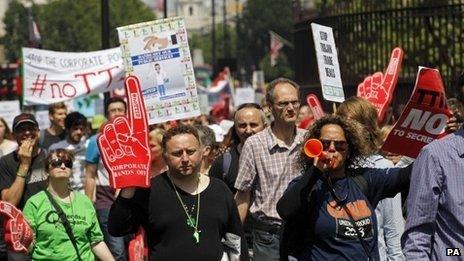US and EU trade talks to resume
- Published

Officials from the European Union and the US will spend this week in Brussels trying to make progress negotiating a controversial trade deal.
The Trans-Atlantic Trade and Investment Partnership (TTIP) aims to stimulate commerce by reducing barriers such as tariffs and differences in regulation.
Critics say the agenda is driven by international business and will be bad for European and American citizens.
It is a little over a year since the talks were launched at a G8 summit.
Consumer fears
It was the UK Prime Minister David Cameron, US President Obama and top EU officials, who set the ball rolling at the summit at Lough Erne in Northern Ireland.
At the time, Mr Cameron said there was no more powerful way to drive economic growth and prosperity than by boosting trade.
The agenda for doing that includes the standard stuff of trade liberalisation - reducing or even eliminating tariffs, taxes that are applied only to imported goods.
The negotiators are also trying to reduce the barriers to trade that arise from different sets of regulations.
They can impede trade because it's more expensive for business to export if it has to go through all the hoops involved in complying with two lots of rules and standards.
Campaigners fear that could lead to lower levels of consumer and environmental protection.
Public interest worries
The talks are also covering how governments treat foreign investment.
One of the most controversial elements is the idea of allowing investors to take governments to international tribunals to seek compensation if they think those rules have been broken.
Campaigners say this could make governments reluctant to regulate in the public interest if they think a foreign investor could be affected.
The concerns about these provisions led the European Commission to conduct a public consultation which has just closed.
British critics of TTIP are particularly concerned that the National Health Service (NHS) could be affected if a future government wanted to reverse any decisions to contract out services to private sector businesses.
That was one of the issues for protesters opposing TTIP who took to the streets across the UK on Saturday ahead of the Brussels talks.
Organisers say that more than a thousand protesters involved in an event in London occupied the square where the European Union has its UK office.
According to the World Development Movement there were other demos in Cambridge, Manchester, York, Newcastle, Nottingham, Edinburgh, Glasgow, Brighton, Bradford, Bexhill, Derby, Cardiff, Sheffield, Swindon, Norwich, Reading, Birmingham and Dublin.
EU assurances on NHS
The union Unite wants the NHS specifically exempted from any TTIP agreement.
The European Commission says the specific fears about possible constraints on future NHS policies are misplaced.
This week of talks in Brussels will be the sixth occasion when the two sides have sat down for detailed official negotiations.
There is no formal timetable for concluding the exercise, but the two sides would probably like to get it all done while the Obama administration is in power in Washington.
In practice that means getting the substance of an agreement done by early 2016. For such complex and contentious stuff that's a substantial challenge.
- Published12 June 2014
- Published23 May 2014